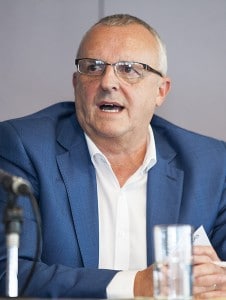The co-founder of Britain’s only trade union-owned alternative business structure (ABS) has warned high street lawyers that there is nothing to stop it competing with them.
He also expressed concern that the profession was becoming obsessed with profit at the expense of the client.
Unionline was set up by the GMB and Communication Workers Union (CWU) as a not-for-profit ABS last year, and serves 850,000 union members.
Tony Rupa, head of legal services at the CWU and an executive board member of Unionline, told the PI Futures conference in Manchester this week: “At the moment we are only targeting trade union members, but there is nothing to stop us competing with lawyers on the high street. We would be a very keen competitor if and when we decide to go into that market.”
He pointed out that Unionline does not have the overheads of private practice law firms, does not need to market and does not need to pay equity partners “thumping big bonuses”.
He described as a “political issue” the question of whether Unionline should only represent union members. Mr Rupa predicted that offering services to all consumers may be a “couple of years” away. “If we could use that revenue to improve services for members, why wouldn’t we?”
Mr Rupa, who is not a lawyer, said there were now 50 staff at Unionline’s offices in Sheffield, specialising in personal injury and employment law but branching out into other areas.
He said the ABS still referred work to its panel of law firms, albeit there are fewer than there were when it started operating. “We can’t deal with the volume of work our client base generates, but the key thing is the service to the individual,” Mr Rupa said.
It was unlikely that in time all work would be taken in-house. Panel law firms would still be needed to provide a truly “national coverage”.
Mr Rupa added that other trades unions were looking closely at its model and at whether, instead of setting up their own ABS, to work with Unionline. “A number of trades unions are looking for Unionline to be their panel firm and this is probably the easiest fit. Smaller unions, with 50,000 to 60,000 members, don’t have the same buying power.”
This buying power meant that Unionline had been able to negotiate a conveyancing deal for its members with a law firm providing the service “at a better price than the high street”.
He noted that just last year certain firms paid their partners £1m bonuses “off the back of good solid trade union work”.
Mr Rupa continued: “When people say there is no money in the law, I don’t quite believe it. I still think there’s the ability for anyone working in the legal marketplace to earn a reasonable living, and there’s absolutely nothing wrong with that, but I do think profit has become the sole motivation for the legal profession and not the client. Hence Unionline was set up and will continue to prosper.”
Andrew Twambley, managing partner of Amelans and director of InjuryLawyers4U, told delegates during the same session that he believed the high street was “dead”, but “if it is not dead, it is dying”.
He went on: “The factory model has gone. You need skilled people to do the work and people who care about clients.”
However, Anthony Hughes, managing director of consultants Hughes Jackson and a former defendant solicitor, said there were “too many small personal injury firms out there” and that volume led to efficiencies.
He advised small firms to “put your egos on one side and be prepared to consolidate with like-minded people” to achieve economies and efficiencies, while maintaining client care.
“If you don’t do it, you’ll run out of cash. That is the end result, I’m afraid. That is the law of evolution. We’re in the midst of massive change and the insurers can smell blood. They think they’re unstoppable.”













So you pays your money and takes your choice. As this story elsewhere on LegalFutures shows, so people still believe in “the high street” http://www.legalfutures.co.uk/latest-news/growth-of-lawstore-brand-enables-abs-to-funnel-work-to-panel-firms